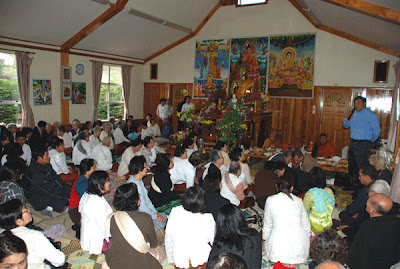
Written by The Phnom Penh Post
Friday, 16 May 2008
Courtesy of Phnom Penh Post at http://www.phnompenhpost.com
May 5: A 39-year-old woman was arrested in Kampong Cham province for allegedly defrauding two local women of $10,290 after she failed to follow through on promises of arranged marriages with Khmer men living overseas. Police said Long Chakrya was arrested after they were alerted to the agreement by brides-to-be Ang Chhengmuoy, 25, and Ham Thol, 45, who said they paid Chakrya more than $10,000 for wedding services that never eventuated.
May 7: Huy Hon, 63, and his family were robbed at their home in Baray district, Kampong Thom province, by two men wielding AK-47s who made off with 3.2 million riels the family had recently earned from selling buffalo for three days. Police said Hon’s family was preparing to go to bed at 9pm when they heard loud banging on their front door. The two robbers outside demanded the buffalo earnings as well as money from a land sale Hon was involved in, which police said Hon had yet to receive.
May 7: Police arrested two men who got drunk at a Kampong Cham high school and then tapped on classroom windows, peaked inside and shouted loudly at students. Police said Sim Ratany, 19, and Vuth Sokhon, 25, were part of group that had drunk “many liters” of alcohol in the afternoon and had gone to Choun Nath high school to make trouble.
May 8: Kandal province police arrested a 20-year-old man they say killed a student on a motorbike by throwing a brick at the victim’s head. Police said the suspect, Sar Sokchet of Rokar Kpos commune, Saang district, was drunk when he tossed the brick at Kuok Vicheka, 21, a grade 12 student at Saang College who died in hospital.
May 8: Military police of Phnom Penh’s Daun Penh district arrested a suspected drug dealer, Sok Dara, 41, after they saw him behaving suspiciously in the capital’s Srah Chak neighborhood at 10:30pm. Police said a search of the man revealed 15 packets of white powder, one packet of pink powder, 11 pink tablets, two black tablets and equipment for smoking drugs.
May 9: A man was killed in an afternoon drinking session gone bad after being sliced four times with hooked knife in a village in Siem Reap province. Chay Pren, 25, of Kaksen Tbong village, was chopped on the head, neck, left armpit and had his ear cut off in the attack, which occurred at about 2pm. Police arrested Touch Yoeum, 39, who they say was feuding with Pren and had been carrying a sickle as well as a hooked knife at the time of the murder.
May 13: A married couple in their 70s were murdered in Sath Pong village, Chhouk district, Kampot province, allegedly by their son, who police say repeatedly struck the couple’s heads with an axe. The suspect, Yim Phet, 38, is yet to be arrested for the killings of his parents, Ngan Yeng, 79, and San Yan, 73.
May 13: A couple was injured and their baby killed in a robbery in Kampong Speu province. Gold trader Nov Sarom, 39, and his wife Lay Phen, 32, were riding their motorbike home from their gold shop in Peanichkam village, Chba Mon district, at 5:10pm when the robbery took place. Sarom was struck with a gun and had a sack of gold and cash taken from him. Phen, who was carrying her child, was shot once in the stomach. The bullet passed through her to hit one-year-old Ly Lay Lay in the head.
May 13: A hotel owner in Stung Treng province was arrested at 6pm on charges of producing and selling drugs in Phnom Penh last August. The Phnom Penh Municipal Court had issued an arrest warrant for Chen Yon An, 37, the owner of the Sok San Hotel in Stung Treng. The court also issued search warrants for the hotel and a second location in order to gather evidence against Yon An.
May 14: A gunfight between police and a group of robbers in Phnom Penh resulted in the death of one robber, while four police officers sustained injuries. Tuol Kok police chief Huot Chanyaran said police received a call at 2:30am about a home break-in at No. 16 Street 219. Four police officers responded to the call to find a group of men breaking down the house door and in the process of removing a $2,000 motorbike. The thieves then opened fire on the police, Chanyaran said, hitting the officers. Police then returned fire, killing one man in his 30s. The others escaped.








